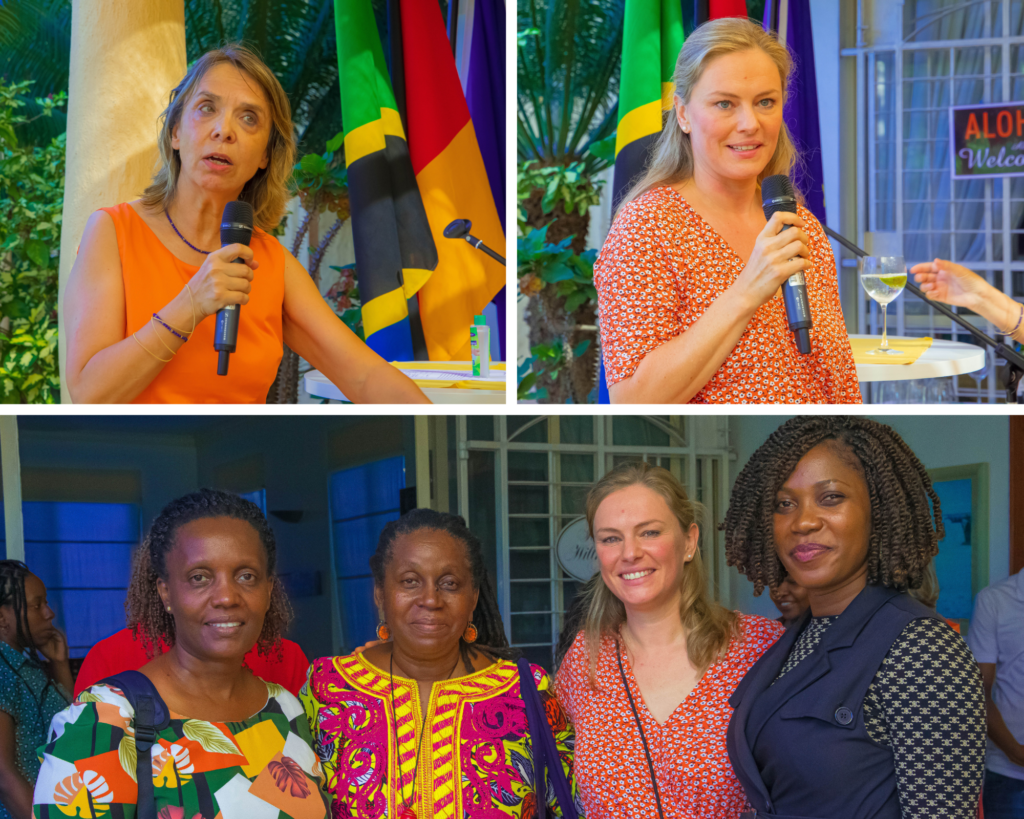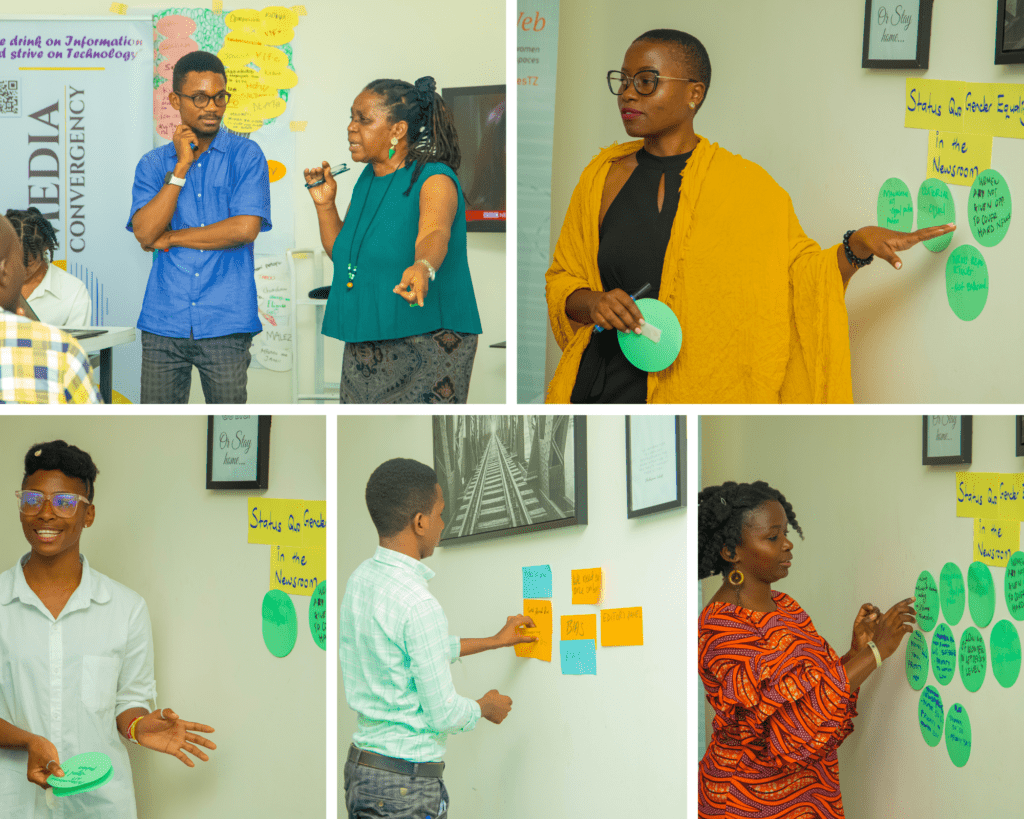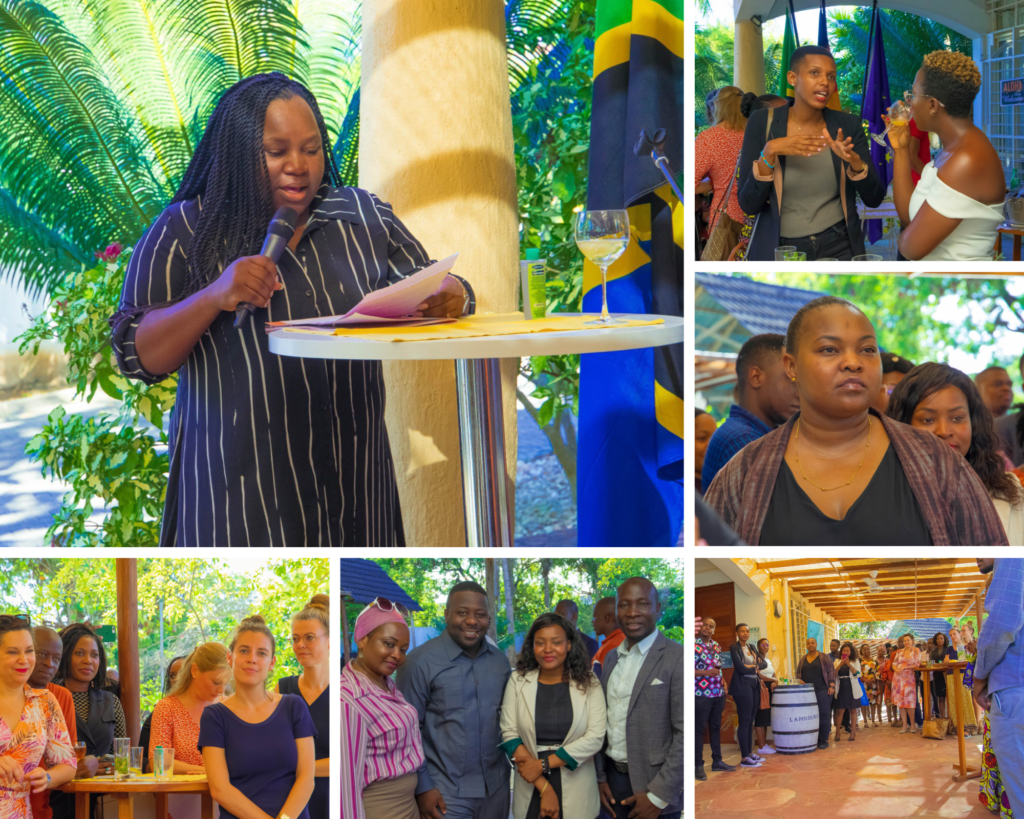Commemorating the 16 Days of Activism through a micro-lens on News Rooms
As part of the 16 days of Activism, an annual campaign that begins on the 25th of November to the 10th of December annually; Tech & Media Convergency (TMC) supported by DW Akademie and the Germany Embassy conducted training to a group of journalists with a focus on reporting effectively on “Gender-Based Violence (GBV) and Online Violence Against Women (OGBV)” as well as “Gender Equality in the Newsroom – Tackling Diversity and Inclusion in Tanzania”.
These intensive workshops took place from the 5th to the 10th of December with the 8th of December being the climax of the program involving a ceremonial cocktail get-together at the residence of the Deputy Ambassador of Germany in Tanzania, Dr. Kathrin Steinbrenner. The Deputy ambassador hosted two organizations (Tech & Media Convergency (TMC) and Launchpad) both doing similar training and both supported by the DW Akademie in a harmonious event drawing and building from the already prevalent intense workshops with the journalists.
As shared during her remarks, the DW Akademie’s Program Director in (Uganda) and Project Director of two programs in the East African Region among them Women at Web, Ms. Miriam Ohlsen, delivered her remarks and emphasized that the workshop for journalists was conducted as part of the 16 Days of Activism campaign and as the kickoff event for the upcoming two-year training series. She also highlighted the key findings that were drawn from the report conducted in Tanzania, Uganda, Kenya, and Rwanda on the state of GBV and OGBV. Among the findings shared was that firstly – most cases of OGBV are not being reported in formalized official channels, secondly – most cases of OGBV end up being published in Online Media only, mainstream media such as radio stations, Television or Print Media rarely cover these stories, and thirdly – victims of OGBV are sexualized when reporting instead of being helped or using a sensitive approach.

On the top left is the Deputy Ambassador of Germany in Tanzania, Dr. Kathrin Steinbrenner, and on the bottom from the left is Dr. Rose Reuben the Executive director of TAMWA and the contributing expert to the Training Program, The Expert Guru Ms. Rosemary Mwakitwange, the DW Akademie’s Program Director in (Uganda) and Project Director of two programs in the East African Region among them Women at Web, Ms. Miriam Ohlsen and Ms. Shamim Nakiryowa, the regional coordinator for the Women at Web Project
Studies have shown that the inclusion of women, both numerically and regarding the positions in which female reporters work can have an impact on the quality of journalism, The Deputy Ambassador of Germany in Tanzania, Dr. Kathrin Steinbrenner emphasized this by stating, how she wished there was longevity in commemorating the 16 days of Activism, “We need more voices and efforts done by organizations, development partners and the government in fostering these conversations and conducting workshops that strongly enhance digital inclusion and advocate against Gender Based Violence and Online Gender-Based Violence.”
 Top left is Ms. Mwakitwange giving a presentation with the co-trainer Anuari Said by her side, on the right is Ms. Jane Shusa the Communications Lead at TWAWEZA, from the left bottom is Ms. Iman Luvanga, an upcoming Podcaster with “Dig it with Imani”,
Top left is Ms. Mwakitwange giving a presentation with the co-trainer Anuari Said by her side, on the right is Ms. Jane Shusa the Communications Lead at TWAWEZA, from the left bottom is Ms. Iman Luvanga, an upcoming Podcaster with “Dig it with Imani”,
While we acknowledge the efforts done by Media Houses in Tanzania in keeping the community informed and addressing pressing issues that are taking place, the issue of Gender Equality seems to be given a blind eye, whether knowingly or unknowingly; this transpires in the newsroom, and goes unnoticed. Participants were invited to reflect on why gender equality in the media is important and jointly develop ideas and strategies on how media houses can promote female journalists and become more inclusive. For instance, one of the learnings was that most gender-related or associated news doesn’t make it to the public because most editors consider it as news that does not sell and those that make it have a negative connotation on the female gender.

CEO of Tech & Media Convergency (TMC) and Women at Web Tanzania co-project Lead Tanzania, Ms. Asha D. Abinallah, and participants during the event ceremony hosted by the Deputy Ambassador of Germany in Tanzania, Dr. Kathrin Steinbrenner on the 8th of December 2022
The CEO of Tech & Media Convergency (TMC) and Women at Web Tanzania co-project Lead, Ms. Asha D. Abinallah highlighted how women journalists are still marginalized and face many challenges. Gender bias and stereotypes are still present reinforcing gender inequality in the media which also affects source diversity in terms of opening the news to the female perspective. Increasing diversity in media contributes to more social participation of women and improves journalism. She described that “To make sure that effort is done simultaneously, as Tech & Media Convergency (TMC), we are working closely with Policy Makers and respective authorities to influence policy. To drive reality at home, together with DW Akademie, we have conducted a study titled “An overview of the state of Online Gender-based Violence of Women in Politics”; where we collected data from 294 women leaders in politics and also did four focus group discussion with 14 members of parliaments in a period of six months. This report has been integral to an increase of interest of the right key players towards realizing the goals of having policies and laws that support the cause.”
In light of these events, Tech & Media Convergency (TMC) through one of its big running programs, Women at Web Tanzania, continues to advocate for the fight against Gender-Based Violence and Online Gender-Based Violence and acknowledges learning from organizations and experts who started years before and set precedence by initiating activities that made life better for victims. Among one of the biggest outreachs as part of the 16 Days of Activism for 2022, Tech & Media Convergency (TMC) through its Safe-Online-Spaces (SOS) Diplomats advocated and capacitated safe online spaces to more than 700 Secondary School students. They hope for more collaborations and impact in inclusion in the future.
For more details about the Women at Web Project, powered by Media convergency visit – https://linktr.ee/WomenAtWebTZ.

